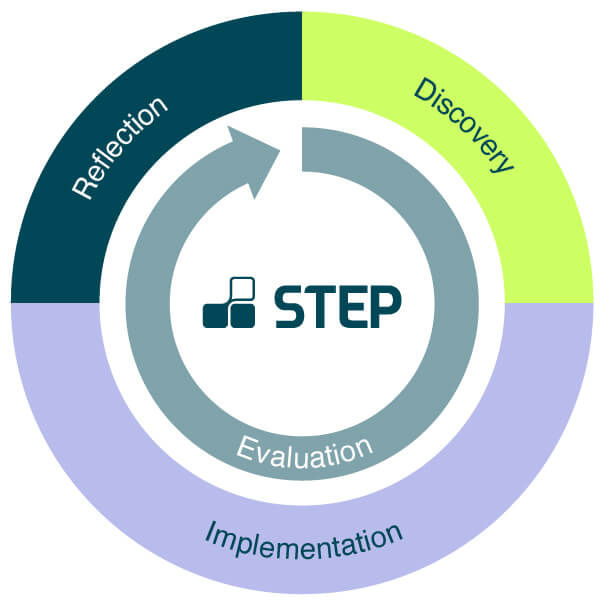STEP Overview
Publication date: 16 May 2025
STEP (Scotland’s Tertiary Enhancement Programme) is the national enhancement programme for the Scottish tertiary sector. It is designed to enable Scotland’s colleges and universities to work together to improve and enhance learning, teaching, the student experience, and staff development across tertiary provision. It is one of the delivery mechanisms of Scotland’s Tertiary Quality Enhancement Framework (TQEF) and is underpinned by the TQEF principles. At the heart of the programme are collaborative enhancement projects that will produce outcomes and outputs of value to the entire tertiary sector.
STEP runs on a four-year cycle that moves through three distinct phases – Discovery, Implementation, and Reflection – during which projects are designed, delivered, and evaluated. The programme is sector-owned and jointly managed by The Quality Assurance Agency for Higher Education (QAA) and College Development Network (CDN).
The topic for the first cycle of STEP (2024-2028) is Supporting Diverse Learner Journeys. This topic was determined through extensive engagement with colleges and universities during 2023-24, including sector-wide co-creation events in October 2023 and March 2024 and a sector-wide survey in April 2024.
The same engagement with the sector highlighted four priority areas.
Publication date: 16 May 2025
Supporting transitions and navigating pathways
Strengthening engagement, community and belonging
Developing skills and capabilities for learning
Delivering tailored, targeted and personalised support
STEP runs on a four-year cycle that moves through three distinct phases – Discovery, Implementation, and Reflection – during which projects are designed, delivered, and evaluated.
During the Discovery phase (year 1), staff and students will come together for a series of Discovery Days to establish collaborative partnerships and design projects that will form the core of the programme.
Between these days, there will be four Navigation Sessions to provide support and maintain momentum.
In developing projects there will be a focus on collaboration, clarity of outcomes and impact, and the formation of a cohesive programme of work that involves every college and university in Scotland.

The focus of the Implementation phase (years 2 and 3) is to launch and conduct the projects planned during the Discovery phase. Project leads and teams will be responsible for taking forward the programme of work identified in their proposals. In each of years two and three, the following activities will take place:
Evaluation will be embedded within each project and undertaken on a continuous basis, with regular reports form each team updating on impact and progress against plans.
In the Reflection phase (year 4), summative evaluation of the STEP programme and its constituent projects and additional activities will be undertaken to consider the impact and effectiveness of the work. As projects conclude, the Reflection phase allows for the dissemination of project outputs throughout and beyond the sector. More fundamentally, an aim of the Reflection phase is to ensure that outputs and outcomes are embedded within the mainstream activities of colleges and universities to become ‘business as usual’.
Also built into the Reflection phase is consultation on the topic for the next four-year STEP cycle. This process will involve colleges, universities, sector agencies and other stakeholders agreeing on the topic that is most relevant to the Scottish sector at that time.